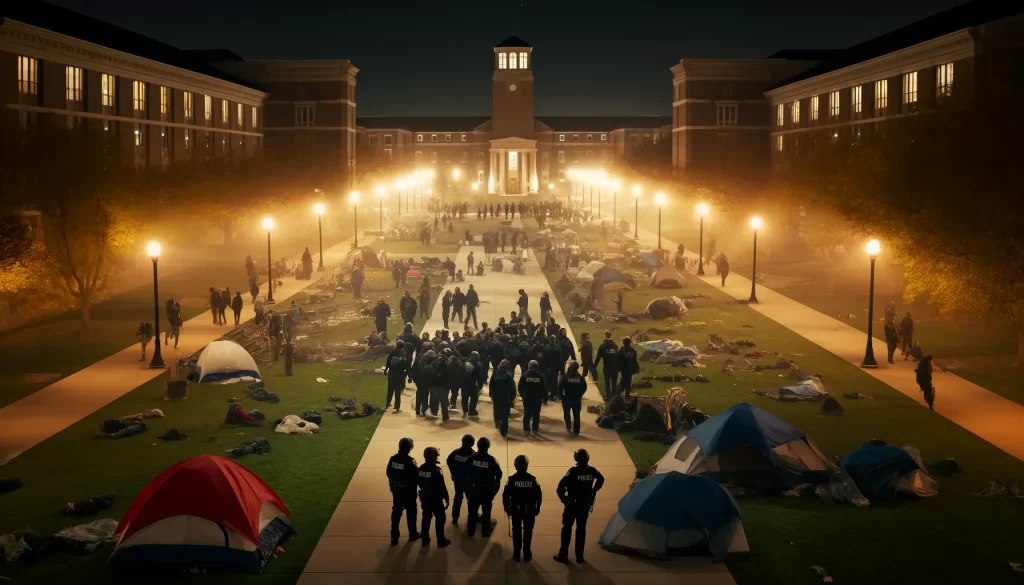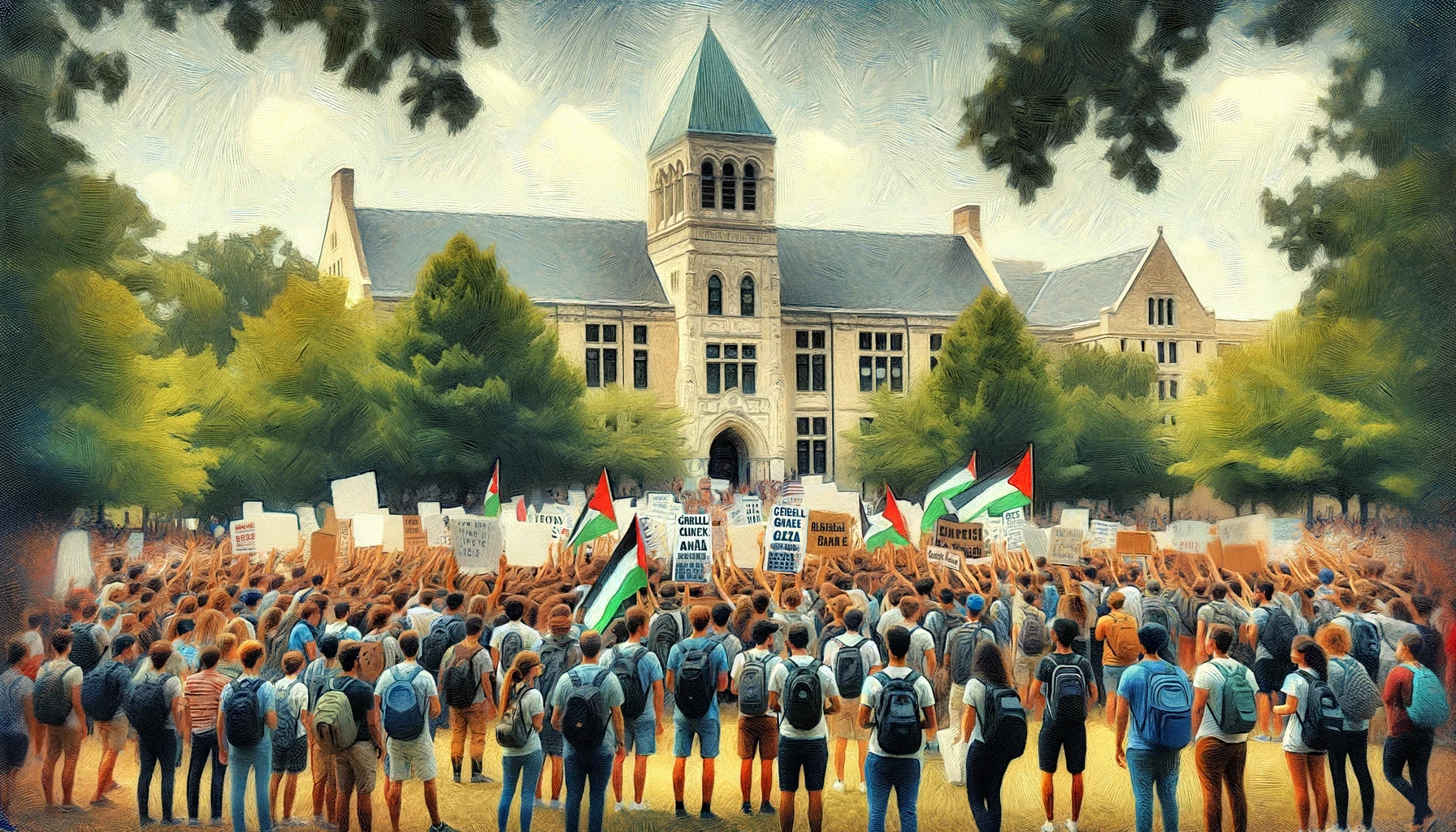In recent days, university campuses across the United States have become hotspots of protest activity due to the ongoing conflict between Israel and Gaza. Students, faculty, and activists have come together to express their concerns and take a stand, leading to clashes with police and intense public debates about the role of universities during times of international conflict.
Major Incidents at Universities
At New York University (NYU), the situation escalated on Monday night when the New York Police Department (NYPD) was called to clear a student encampment at Gould Plaza. This action was taken at the request of NYU officials after tensions grew throughout the day. According to NYPD Deputy Commissioner Kaz Daughtry, approximately 10 to 15 faculty members joined the students and actively resisted police orders, which included chaining themselves together. Daughtry even suggested there were “professional agitators” among the demonstrators, adding, “Somebody is behind this.”
Tarik Sheppard, another NYPD official, expressed surprise at the faculty’s involvement, suggesting that teachers and professors are expected to focus on education rather than “…out there protesting.”
In a separate incident at California State Polytechnic University Humboldt, students barricaded themselves inside Siemens Hall. The university responded by locking down the building and suspending key card access, effectively shutting the campus until the situation could be resolved. The university called the situation “dangerous and volatile” and urged everyone to stay away while asking the protesters to comply with law enforcement and vacate the building peacefully.

Responses and Reactions
These actions have prompted a variety of responses from different groups involved. At Columbia University, where this wave of protests seems to have started, the university administration decided to switch many classes to a hybrid format for the remainder of the semester, citing safety as their highest priority.
This period of unrest comes in the wake of allegations of antisemitism and bias on campuses, sparked by the deadly October 7 attack by Hamas and the subsequent military responses. University leaders have been criticized both for potentially not doing enough to protect students from bias and for stifling free speech by cracking down on political protests.
Arrests and Official Statements
Over at Yale University, 47 students were arrested for their part in the protests and are facing potential disciplinary actions, including suspension. Yale’s President Peter Salovey expressed his disappointment that his calls for civil discourse and peaceful protest were not followed, noting that the campus atmosphere had become increasingly charged for various community groups including Jewish, Muslim, Israeli, Arab, and Palestinian members.
One student protester from Yale, Tacey Hutten, stated, “Not only are we not deterred, we may even be more engaged now. … We’re resolute. I’ve been involved in this struggle for a couple of months now and plan to be for the rest of my life.”
Other Campus Actions
This surge in campus activism is not isolated to just a few universities. At Pomona College in California, students were arrested after they stormed the president’s office earlier this month. Similarly, at the University of California at Berkeley, protests turned violent in February when windows were broken during a disruption of a talk by an Israeli lawyer.
This article is based on the following article:

Background Information
With this comprehensive background, readers can approach the topic with a well-rounded understanding, appreciating both the immediate and broader implications of university protests related to international conflicts like the Israel-Gaza situation.
Detailed Background on the Israel-Gaza Conflict
Historical Context
The Israeli-Palestinian conflict has deep historical roots, largely stemming from competing nationalist movements amid the complex demographics of the Middle East. Key points include:
- Late 19th and Early 20th Century: The area known today as Israel and Palestine was populated by a majority Arab population and a minority Jewish population within the Ottoman Empire. Post World War I, the British took control, promising to establish a “national home for the Jewish people” while also respecting the rights of the Arab inhabitants.
- Post-World War II and Establishment of Israel: In 1948, Israel was officially established as a sovereign state, leading to the first Arab-Israeli war. Hundreds of thousands of Palestinians were displaced or fled from their homes in what is now Israel, an event Palestinians refer to as the Nakba or “catastrophe.”
- Subsequent Conflicts: There have been numerous wars and conflicts between Israel and its Arab neighbors, including several Palestinian uprisings (intifadas). Gaza, now controlled by Hamas, has been a frequent flashpoint due to its strategic importance and economic blockade imposed by Israel and Egypt, aimed at restricting Hamas.
Recent Tensions
The conflict is characterized by cycles of violence, including rocket attacks from militants in Gaza and retaliatory strikes by Israel. Each escalation contributes to significant human suffering and increases international political tension.
Understanding University Protests: Historical and Social Perspectives
Tradition of Campus Activism
Universities have long been epicenters for social change, historically engaging in movements such as civil rights, anti-war protests during the Vietnam War, and more contemporary issues like climate change and racial justice. This tradition stems from the concentration of young, educated individuals who are often exposed to new ideas that challenge the status quo.
Modern Campus Activism
Today, university protests can quickly gain national or even global attention through social media and other digital platforms, amplifying students’ voices beyond the physical campus. These protests can influence public policy, sway public opinion, and occasionally result in tangible changes within institutions.
Antisemitism and Anti-Zionism
Definitions and Distinctions
- Antisemitism involves discrimination against Jews as a religious or racial group. It is often rooted in stereotypes and can lead to exclusion, violence, and other forms of persecution.
- Anti-Zionism, conversely, is criticism of the ideology and policies of Zionism and the Israeli state. While anti-Zionism can be a legitimate political position, it sometimes crosses into antisemitism when it employs derogatory stereotypes or denies the rights of Jews to self-determination.
Hybrid Classes
Evolution of Educational Formats
The use of technology in education has evolved significantly, particularly with the advent of the internet and mobile technology. Hybrid classes are one result of this evolution, blending traditional classroom experiences with online components to create a flexible and accessible learning environment.
Importance During Crises
Hybrid learning has proven especially vital during crises that disrupt normal operations, such as the COVID-19 pandemic or, in the case of these protests, security concerns on campus. They allow institutions to maintain continuity and educational standards amidst external disruptions.
The Balancing Act: Safety, Free Speech, and Institutional Responsibility
University Responsibilities
Universities face the complex task of balancing safety and security with the imperative to uphold free speech and academic freedom. Decisions to call in law enforcement during protests are often controversial and can be seen as either necessary for safety or as suppressive of free expression.
Legal and Ethical Considerations
These decisions involve legal and ethical considerations, weighing the rights of protesters against the rights of other students and faculty to a safe and non-disruptive educational environment.

Debate/Essay Questions
- To what extent should universities go to protect students from hate speech and antisemitism without infringing on free speech?
- Are students justified to use disruptive tactics, such as barricading buildings, to bring attention to international issues?
Please subscribe to Insight Fortnight, our biweekly newsletter!
